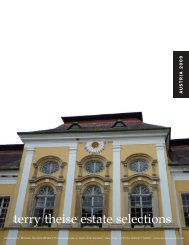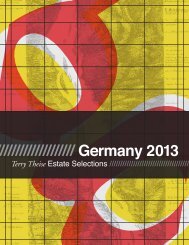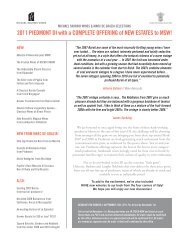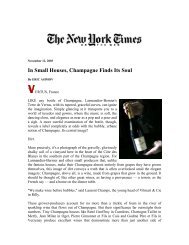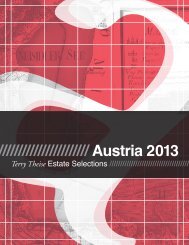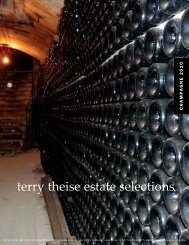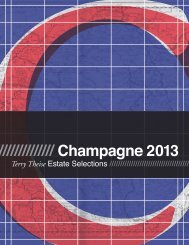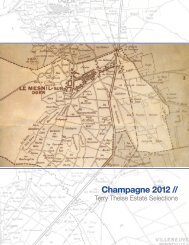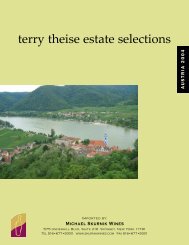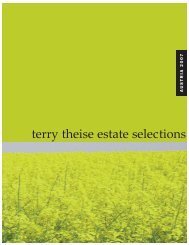German Catalog 2006 USE THIS ONE.qxp - Michael Skurnik Wines
German Catalog 2006 USE THIS ONE.qxp - Michael Skurnik Wines
German Catalog 2006 USE THIS ONE.qxp - Michael Skurnik Wines
You also want an ePaper? Increase the reach of your titles
YUMPU automatically turns print PDFs into web optimized ePapers that Google loves.
152<br />
pfalz wines<br />
In the pretty walled town of Freinsheim my favorite <strong>German</strong> chef Dieter Luther has a restaurant<br />
and a few charming rooms. I’ve been staying and dining there for many years now. Luther’s<br />
a very droll guy; when you tell him your meal was fabulous he practically laughs at you, like Oh<br />
come on now, gimme a break. He’s a wine-guy too and he often asks me how my days go and how<br />
the wines are.<br />
His list is naturally heavy into Pfalz wines, and he’s both a creature of his times and a businessman<br />
serving a clientele, so all the wines are, , Trocken. This year he said something<br />
that stunned me. He was “unhappy”, he said, with modern Pfalz wines. Really? Yes, because<br />
they had become too sweet. “Too sweet?” I asked, astonished. Yes, too sweet he said; he didn’t<br />
like all these supposedly dry wines with six-seven-eight grams of residual sugar. Say WHAT?!?!<br />
If there’s the slightest sensible thing about the whole Trocken fetish it’s that most of the Rieslings<br />
tickle the legal limit of 9 grams of (believe me, untasteable) residual sugar.<br />
I left that conversation more depressed than even a<br />
Luther meal could relieve. The Pfalz, once my favorite<br />
region, once a hyper-oxygenated anything-goes playground<br />
of wine’s manifold possibilities, has become suffocated<br />
by a pathological aversion to as much as a grain<br />
of sugar. I get the sense if these pathetic dupes could<br />
somehow get into negative numbers (“My wine is so dry<br />
it has MINUS-5 grams of sugar!”) they still wouldn’t be<br />
satisfied. Perhaps they should simply evaporate their<br />
wines and suck on the ash.<br />
Pfalz vineyard view<br />
Far from the wonderfully human playfulness of<br />
twenty years ago, the Pfalz these days feels positively<br />
robotic. It is sad sad sad. All this potential, laid to waste;<br />
an Eden of the Unexamined Palate.<br />
I used to think that notions like “kilocalories of sunlight”<br />
were specious, but now I’m starting to wonder. I<br />
suspect there is indeed a difference between the sun-<br />
warmth in Alsace and that of the Pfalz, an hour or two<br />
North. Because most Alsace Riesling basically works,<br />
even at its most dry. One might have small aesthetic cavils<br />
with this wine or that, but the formula is sound. It is<br />
just the opposite in the Pfalz. There are successful, even<br />
superb dry Rieslings there, but the essential basis is seriously<br />
flawed. That is, unless you like (or think you like)<br />
shrill, meager, sharp and bitter wines.<br />
The Pfalz is besieged with local tourism from the big<br />
cities Mannheim, Ludwigshafen, Frankenthal and<br />
Heidelberg. Summer weekends are wall-to-wall swirl &<br />
hurl. For some reason (perhaps chemical emissions from<br />
the heavy industry near Frankenthal?) these fine<br />
denizens of taste have embraced masochism as their aesthetic<br />
template. The poor growers, who have to sell their<br />
wines, after all, have not only to comply, but also to<br />
appear enthusiastic, and to embrace a guiding philosophy<br />
of dryness. It goes emphatically against common sense,<br />
but livings must be made.<br />
I don’t know why the wines don’t work. I drink<br />
plenty of honestly dry Riesling from Austria and Alsace.<br />
Indeed, I like dry Riesling. I’m not sure why a wine with<br />
13% alcohol would taste thin and fruitless; I only know<br />
that most of them do. I have tried and tried to like them.<br />
It’s tiresome and frustrating to kvetch.<br />
Another lamentable tendency in my beloved and<br />
endangered Pfalz is to plant more and more Pinot Blanc<br />
and Pinot Gris (and Chardonnay, for which they will<br />
writhe eternally), the better to produce (mostly) neutral<br />
and softer dry wines. A lot of old dubious vines have<br />
been hacked up—Optima, Siegerrebe, Ortega, Morio-<br />
Muscat - and one is duly grateful; that land was probably<br />
unsuitable for Riesling.



